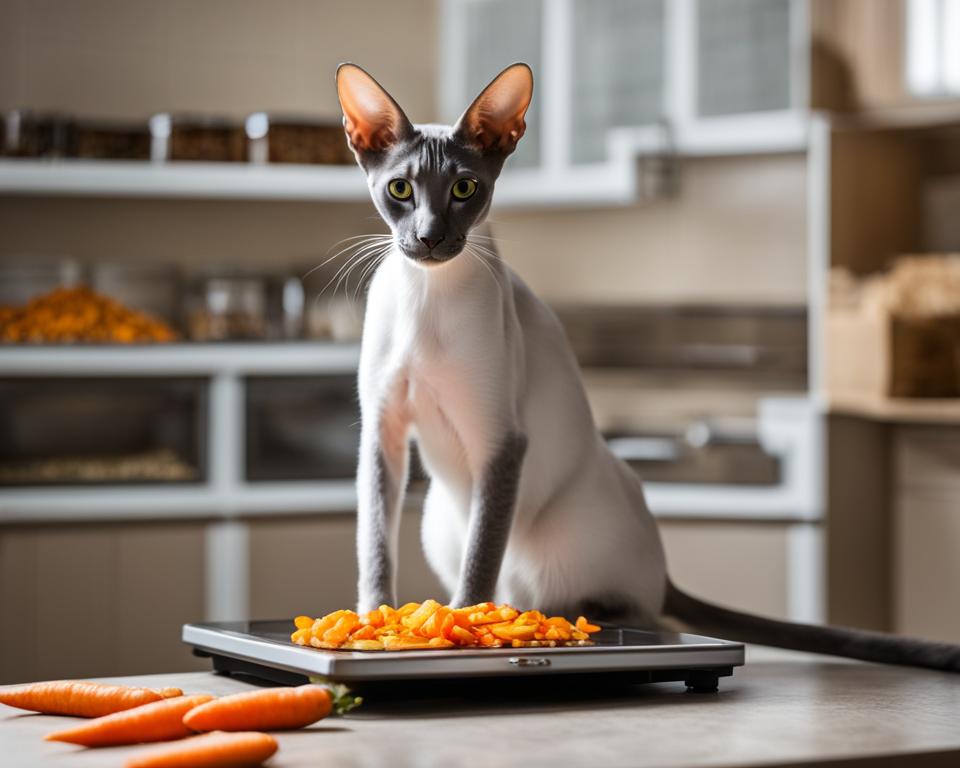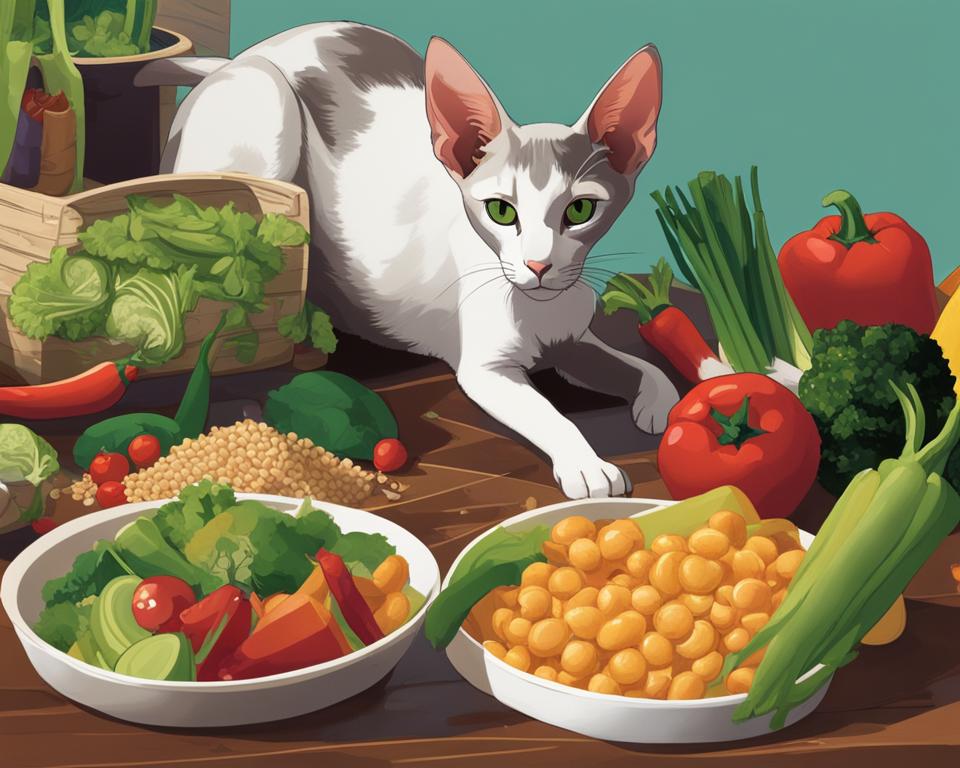Oriental Shorthaired cats are a unique breed known for their energy and playfulness. They make great companions and pets, especially for families with children and other pets. However, it’s important to be aware of the health concerns that can affect this breed. Obesity is a significant issue that can lead to various health problems, including arthritis, diabetes, and a shorter lifespan. By following these obesity prevention tips, you can ensure that your Oriental Shorthair maintains a healthy weight and optimal overall health.
Key Takeaways:
- Preventing obesity in Oriental Shorthairs is crucial for their health and well-being.
- Obesity can lead to various health problems and a shorter lifespan.
- Consult with your veterinarian to determine the ideal weight for your cat and develop a suitable diet plan.
- Regular exercise is essential in preventing obesity in Oriental Shorthairs.
- Choose high-quality cat food that meets their nutritional needs and consider meal feeding instead of free-feeding.
Understanding Your Oriental Shorthair’s Dietary Needs
Proper nutrition plays a crucial role in managing the weight of your Oriental Shorthair. Each cat’s dietary needs may vary, so it’s essential to consult with your veterinarian to develop a customized diet plan. Together, you can determine the ideal weight for your cat and create a feeding routine that supports their health and weight management goals.
Feeding high-quality food that meets your Oriental Shorthair’s nutritional needs is essential. Look for cat food that is rich in protein and free from fillers or artificial additives. Your veterinarian can recommend specific brands or formulas that are suitable for your cat’s age, activity level, and overall health.
In addition to selecting the right food, it’s important to avoid overfeeding. Instead of leaving food out all day, implement scheduled meal times for your cat. This helps prevent excessive calorie intake and allows for better portion control. Your veterinarian can guide you in determining the appropriate serving size for your Oriental Shorthair based on their weight and nutritional needs.
Benefits of a Balanced Diet
Providing your Oriental Shorthair with a balanced diet offers numerous benefits beyond weight management. A well-rounded diet supports their overall health, including the maintenance of a healthy coat, strong immune system, and optimal organ function. It also helps prevent nutrient deficiencies and reduces the risk of developing certain health issues.
| Benefits of a Balanced Diet | Explanation |
|---|---|
| Healthy Weight Maintenance | A balanced diet promotes a healthy weight, preventing obesity and associated health problems. |
| Improved Digestion | The right mix of nutrients supports proper digestion, reducing the likelihood of gastrointestinal issues. |
| Strong Immune System | Adequate nutrition strengthens the immune system, helping your Oriental Shorthair fight off infections and diseases. |
| Healthy Skin and Coat | A balanced diet provides essential fatty acids and nutrients necessary for a shiny, healthy coat and skin. |
| Optimal Organ Function | The right nutrients support the healthy functioning of vital organs, such as the heart, liver, and kidneys. |
By understanding your Oriental Shorthair’s dietary needs and providing them with a balanced diet, you can help them maintain a healthy weight and enjoy optimal overall health. Remember to consult with your veterinarian for personalized advice and guidance on the best nutrition plan for your cat.
Encouraging Exercise for a Healthy Weight
Regular exercise is essential in preventing obesity in Oriental Shorthairs. These active and playful cats thrive when given the opportunity to engage in physical activity. By encouraging exercise, you can help your Oriental Shorthair maintain a healthy weight and prevent the negative health effects of obesity.
One effective way to promote exercise is by providing interactive toys that stimulate your cat’s natural hunting instincts. Toys that mimic prey, such as feather wands or laser pointers, can engage your cat and encourage them to chase and pounce. Rotate the toys regularly to keep things interesting for your feline friend.
Scheduling several short play sessions throughout the day is important for keeping your Oriental Shorthair active. Set aside specific times each day to engage in interactive play. This not only helps your cat burn calories but also provides mental stimulation, keeping them happy and content.
In addition to playtime, consider providing vertical spaces for your Oriental Shorthair to explore. Cat trees or shelves can encourage climbing and jumping, providing additional opportunities for exercise. Creating an enriching environment with scratching posts and hiding places can also keep your cat active and entertained.
| Exercise Tips for Oriental Shorthairs |
|---|
| 1. Use interactive toys to engage your cat in playtime. |
| 2. Schedule several short play sessions throughout the day. |
| 3. Provide vertical spaces for climbing and jumping. |
| 4. Create an enriching environment with scratching posts and hiding places. |
Remember to start any exercise regimen gradually and consult with your veterinarian before making significant changes to your Oriental Shorthair’s activity levels. By incorporating regular exercise into your cat’s daily routine, you can help them maintain a healthy weight and overall well-being.
Oriental Shorthair Obesity Prevention Tips: Choosing the Right Food for Weight Management
When it comes to preventing obesity in Oriental Shorthairs, choosing the right food is crucial. Opting for high-quality cat food that meets their nutritional needs is essential for maintaining a healthy weight. Look for formulas that are free from fillers and contain a balanced combination of protein, fats, and carbohydrates. Consider switching to canned food, as it tends to be lower in carbohydrates and higher in protein compared to dry kibble.
Canned food also encourages meal feeding, which helps control portion sizes and prevents overeating. By implementing scheduled meal times rather than free-feeding, you can have better control over your cat’s calorie intake. Talk to your veterinarian about the appropriate daily feeding amount based on your Oriental Shorthair’s weight and activity levels.
Additionally, it’s important to avoid feeding your cat table scraps or indulging them with excessive treats. While treats can be a part of their diet, it’s crucial to choose healthier alternatives and give them in moderation. Consider incorporating playtime or affection as rewards instead of relying solely on treats. By being mindful of their food choices and portion sizes, you can help your Oriental Shorthair maintain a healthy weight and prevent obesity-related health issues.
Table: Comparison of Cat Food Options
| Food Type | Advantages | Considerations |
|---|---|---|
| Dry Kibble | – Convenient and economical – Helps maintain dental health – Can be left out for free-feeding |
– Higher in carbohydrates – May contribute to overeating |
| Canned Food | – Higher in protein, lower in carbohydrates – Encourages portion control – Provides hydration |
– More expensive than dry kibble – Requires meal feeding |
| Raw or Homemade Diets | – Offers more control over ingredients and quality – Can be tailored to specific dietary needs |
– Requires careful preparation and balance of nutrients – Can be time-consuming and expensive |

Conduct thorough research and consult with your veterinarian to determine the best food option for your Oriental Shorthair’s weight management. Remember to transition to a new diet gradually to avoid digestive issues. By making informed decisions about their food, you can contribute to your cat’s overall health and prevent obesity.
Avoid Overindulgence in Treats
Treats can be a delightful way to show your love and appreciation for your Oriental Shorthair. However, overindulgence in treats can contribute to obesity, which can lead to serious health issues. It’s important to find a balance and avoid excessive treat consumption to maintain your cat’s healthy weight. Instead of relying on treats as the primary form of reward, consider alternative ways to show affection and engage with your feline companion.
One way to limit treat intake is to replace treats with playtime. Engaging in interactive play sessions not only provides mental stimulation but also helps your Oriental Shorthair burn calories and maintain a healthy weight. Use toys that encourage your cat’s natural hunting instincts, such as teaser wands or puzzle toys. By redirecting their desire for treats into play, you can strengthen the bond with your cat while promoting their physical and mental well-being.
When giving treats, it’s essential to choose those that are low in calories and specifically formulated for cats. Avoid using human food as treats, as it can be high in unhealthy fats and sugars. Read the nutritional information on treat packaging carefully to ensure that the treats are appropriate for your cat’s diet and weight management goals. Remember, moderation is key in treating your Oriental Shorthair without compromising their health.
| Tips for Managing Treats | Benefit |
|---|---|
| Limit treats to a certain number per day | Controls calorie intake and prevents overindulgence |
| Choose low-calorie, cat-specific treats | Promotes healthy snacking and weight management |
| Use treats as a reward for play sessions | Promotes physical activity and mental stimulation |
| Avoid using human food as treats | Prevents unnecessary weight gain and potential health issues |
By being mindful of treat consumption and implementing healthy alternatives, you can prevent excessive weight gain in your Oriental Shorthair and help them lead a long and healthy life.
Oriental Shorthair Weight Management and Obesity Prevention Tips
Monitoring your Oriental Shorthair’s weight is essential in preventing obesity. Regular weigh-ins can help you detect any changes and address them promptly, ensuring your cat maintains a healthy weight. Consider using a baby scale or your bathroom scale for periodic measurements. Even small weight gains can be significant for cats, so it’s important to stay vigilant. By closely monitoring your cat’s weight, you can effectively manage their health and prevent obesity-related issues.
In addition to regular weight checks, partnering with your veterinarian for routine wellness exams is crucial for preventing obesity in Oriental Shorthairs. During these exams, your vet can assess your cat’s weight, detect any health issues, and provide guidance on diet and exercise. They can also perform bloodwork to identify any underlying conditions that may contribute to weight gain. Regular check-ups are an essential part of proactive obesity prevention for Oriental Shorthairs, ensuring your cat’s overall health and wellbeing.
Tips for Oriental Shorthair Weight Management
When it comes to weight management for Oriental Shorthairs, implementing these tips can help prevent obesity and promote a healthy lifestyle:
- Consult with your veterinarian to determine the ideal weight for your cat and develop an appropriate diet plan
- Feed high-quality food that meets their nutritional needs and avoid overfeeding
- Provide interactive toys and schedule multiple short play sessions throughout the day to encourage exercise
- Consider switching to canned food, which encourages meal feeding and is generally lower in carbohydrates and higher in protein
- Avoid overindulgence in treats and opt for healthy alternatives like playtime or affection
By following these weight management tips and regularly monitoring your Oriental Shorthair’s weight, you can ensure their optimal health and prevent the negative effects of obesity.
| Weight Category | Body Condition Score |
|---|---|
| Underweight | 1-3 |
| Ideal Weight | 4-5 |
| Overweight | 6-8 |

Oriental Shorthair Cat Health and Obesity Prevention Tips
Oriental Shorthair cats are known for their energetic nature and playful personalities. To ensure the overall health and longevity of your Oriental Shorthair, it’s crucial to prioritize their wellness. One major concern for this breed is obesity, which can lead to various health issues. By following these obesity prevention tips, you can help your Oriental Shorthair maintain a healthy weight and enjoy optimal cat health.
Cat Health and Routine Wellness Exams
Regular veterinary check-ups are essential in preventing obesity and ensuring your Oriental Shorthair’s overall health. During these wellness exams, your veterinarian can assess your cat’s weight, detect any health issues, and provide guidance on diet and exercise. They may also perform bloodwork to identify any underlying conditions that may contribute to weight gain. By scheduling routine wellness exams, you can stay proactive in preventing obesity and promoting your cat’s well-being.
Customized Dietary Plans and Weight Management
Consulting with your veterinarian is essential for understanding your Oriental Shorthair’s dietary needs and developing a customized plan for weight management. Your veterinarian can determine the ideal weight for your cat and guide you in selecting high-quality cat food that meets their nutritional needs. They may also recommend scheduled meal times instead of free-feeding and advise on portion control. By working closely with your vet, you can ensure that your Oriental Shorthair receives the right diet for weight management and overall health.
The Importance of Regular Exercise
Regular exercise is vital for preventing obesity in Oriental Shorthairs. Engaging your cat in daily playtime sessions can help keep them physically active and mentally stimulated. Provide interactive toys that encourage their natural hunting instincts and schedule multiple short play sessions throughout the day. By promoting regular exercise, you can help your Oriental Shorthair maintain a healthy weight and prevent the negative health effects associated with obesity.
The Role of Treats and Monitoring Weight
While treats can be a source of joy for your Oriental Shorthair, it’s crucial to avoid overindulgence and choose healthy alternatives. Limit the number of treats and consider their calorie content. Instead of relying solely on treats for rewards, use playtime or affection as an alternative. Additionally, monitoring your cat’s weight regularly is essential in preventing obesity. Small weight gains can be significant for cats, so regularly weighing your Oriental Shorthair can help you detect any changes and address them promptly.
| Obesity Prevention Tips for Oriental Shorthairs |
|---|
| 1. Schedule routine wellness exams with your veterinarian to monitor your cat’s weight and overall health. |
| 2. Consult with your vet to develop a customized dietary plan for weight management. |
| 3. Encourage regular exercise through playtime and interactive toys. |
| 4. Limit treats and choose healthy alternatives for rewards. |
| 5. Monitor your Oriental Shorthair’s weight regularly to detect any changes. |
Partnering with Your Veterinarian for Preventative Care
When it comes to the health of your Oriental Shorthair, partnering with your veterinarian is crucial for feline obesity prevention and overall well-being. Your veterinarian is a trusted resource who can provide personalized advice and guidance based on your cat’s specific needs. By working together, you can create a preventative care plan that ensures your Oriental Shorthair maintains a healthy weight and enjoys optimal health throughout their life.
Regular communication with your veterinarian is key in this partnership. Schedule routine check-ups to monitor your cat’s weight and overall health. During these exams, your veterinarian can assess your cat’s body condition, detect any potential health issues, and provide necessary guidance on diet and exercise. By staying proactive and addressing any concerns promptly, you can prevent obesity and mitigate the risk of associated health problems.
In addition to routine wellness exams, your veterinarian can also perform bloodwork to identify any underlying conditions that may contribute to weight gain. This comprehensive approach helps ensure that your Oriental Shorthair receives the necessary care to maintain a healthy weight and prevent obesity-related issues. Regular monitoring and early intervention can make a significant difference in your cat’s long-term health and well-being.
Remember, preventing obesity in your Oriental Shorthair is a continuous effort that requires collaboration between you and your veterinarian. By partnering with your trusted veterinary professional, you can navigate the challenges of feline obesity prevention, optimize your cat’s health, and provide them with the best possible care.
FAQ
What health concerns can obesity lead to in Oriental Shorthairs?
Obesity can lead to various health problems in Oriental Shorthairs, including arthritis, diabetes, and a shorter lifespan.
How can I determine the ideal weight for my Oriental Shorthair?
It’s essential to consult with your veterinarian to determine the ideal weight for your cat and develop an appropriate diet plan.
How often should I feed my Oriental Shorthair?
Implement scheduled meal times instead of an all-day buffet to avoid overfeeding your Oriental Shorthair.
How can I keep my Oriental Shorthair physically active?
Engaging your cat’s natural instincts through playtime is a great way to keep them physically active. Provide interactive toys that mimic hunting behaviors and schedule several short play sessions throughout the day.
What type of food should I feed my Oriental Shorthair for weight management?
Opt for high-quality cat food that meets their nutritional needs and is free from fillers. Consider switching to canned food, which encourages meal feeding and is generally lower in carbohydrates and higher in protein.
How can I limit treats for my Oriental Shorthair?
Instead of constantly giving your cat treats, reward them with playtime or affection. Treats should be given in moderation, and it’s crucial to consider their calorie content.
How often should I monitor my Oriental Shorthair’s weight?
Regularly weigh your cat to detect any changes and address them promptly. Even small weight gains can be significant for cats.
Why are routine wellness exams important for my Oriental Shorthair?
Routine wellness exams with your veterinarian are crucial for preventing obesity and ensuring your Oriental Shorthair’s overall health. During these exams, your vet can assess your cat’s weight, detect any health issues, and provide guidance on diet and exercise.
How can I work with my veterinarian to prevent obesity in my Oriental Shorthair?
Partnering with your veterinarian is key to successful prevention of obesity in Oriental Shorthairs. They can provide personalized advice based on your cat’s specific needs and monitor their health throughout their lifespan.

Leave a Reply